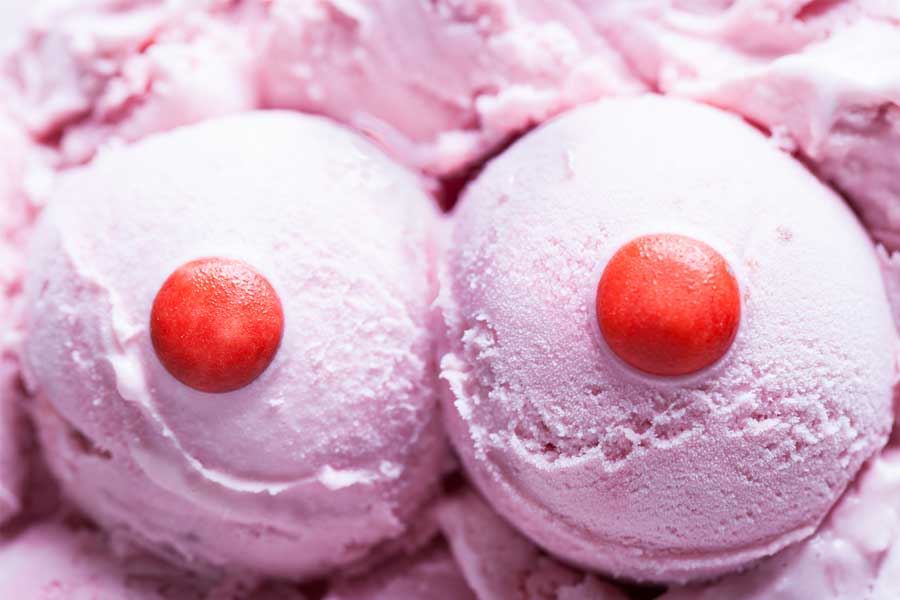Trusted for 25+ Years
Breast Tenderness & Pain

Dr. Lisa Lawless, CEO of Holistic Wisdom
Clinical Psychotherapist: Relationship & Sexual Health Expert

What Causes Breast Pain?
Breast pain (mastalgia) can be caused by a variety of things such as cyclical breast pain (related to the menstrual cycle), fluctuation in hormone levels, breastfeeding, fibrocystic breast disease, breast cancer and treatment, a fatty acid imbalance, extramammary breast pain (radiating pain from elsewhere), and infection, injury and skin conditions. Let's explore in more detail some of the most common contributors:
The Menstrual Cycle
It's pretty common for a woman to experience breast tenderness with ovulation. Symptoms of premenstrual breast tenderness may range from mild to severe. Symptoms typically peak just before each menstrual period and improve immediately after or during. The tenderness is often lower in women taking birth control pills as ovulation is not occurring.
While ovulation is most likely causing it based on it being a regular occurrence, you should check your breasts throughout your cycle to determine what is typical for you as a baseline. You can take notes on a calendar by documenting any discomfort before and during your period.
Poor Fitting Bra
Breast pain can be caused by a tight-fitting bra or one that does not give the proper support. Skin damage to the breast through chafing from wearing or not wearing a bra can also cause pain.
Animal Fat
Excessive dietary fat, especially animal fats, contributes to breast pain. It may have to do with an animal's hormones, what they have been given to eat, or how the fat is broken down. Remember that animals are given things like hormones to grow faster and get the meat to market, so it can be advisable to consume small quantities of meat, if at all.
Dairy products are often a culprit as well. Some women may have an underlying allergy to dairy products or may react similarly to the hormones that were fed to the cows. Dairy is an inflammatory food, which may also be a contributing factor. See our guide: Nutrition Guide for Good Sex & Health for more helpful nutritional information.
Caffeine
Caffeine can lead to changes in hormone levels, which may cause breast pain and the formation of breast cysts.
Salt
High salt diets increase swelling by causing fluid retention, which can strain breast tissue.
Medications
Some psychiatric medications or antidepressants may increase breast pain. Even some cholesterol-lowering and heart medications can cause breast changes.
Stress
Scientists are only beginning to understand the links between the immune system, our emotions, and our hormones. Everyone has different stress levels and stressors, but we do know that too much stress is not good for the body and can influence hormones which may, in turn, affect the breasts.
Pregnancy
Breast tenderness can also be a pregnancy symptom but would not typically occur before a missed period. It can also be a sign of something more serious such as cancer; check for any unusual lumps, increased areas of sensitivity or pain, or other changes that may cause concern. If you detect something or just want reassurance, you can make an appointment to see your healthcare provider.
Improving Breast Comfort
There are a few things to improve breast health, such as:
Vitamins
Add vitamins E and A to your diet. Vitamin E protects breasts from free radical damage (which destroys cells). It is also a good source of essential fatty acids, which may help those with a fatty acid imbalance linked to breast pain.
Vitamin A has been shown to have anti-breast cancer properties. Studies have shown that peri-menopausal women who consume high levels of vitamin A in their diet seem to have a lower risk of breast cancer, even with a family history of breast cancer.
Please take note that consuming high doses of fat-soluble vitamins can be harmful, so only take the recommended dose. Speaking with a nutritionist or your physician to ensure proper nutrient consumption may be helpful and worth your time.
Reduce Salt Intake
Reduce the salt in your diet, especially 1 to 2 weeks before your period.
Wear A Properly Fitted Bra
Wear a bra that gives good support, especially if you exercise or have large breasts.
Using Heat To Ease Pain
Putting heat on your breasts with a heating pad or warm water bottle may help if you have pain.
Herbal Teas
Cornsilk, buchu and uva ursi teas are available at most health food stores and are three very mild diuretics that seem to relieve breast tenderness in some women. By flushing fluid from your system, diuretics can help reduce breast swelling.
Edible Oils
Evening primrose oil, Vitamin E, and black currant seed oil are rich sources of essential fatty acids. These are converted to prostaglandin, which is necessary for fighting infection. Many women find this oil reduces breast tenderness associated with PMS.
Acupuncture
Acupuncture can relieve a variety of health issues, including hormonal imbalances that may contribute to breast pain. For more information, please see our educational guide: Sex & Acupuncture.
In Closing
If you are unsure what is causing your breast pain, it is always best to consult with your physician to rule out any health conditions that may require treatment and, at the very least, give you peace of mind.


